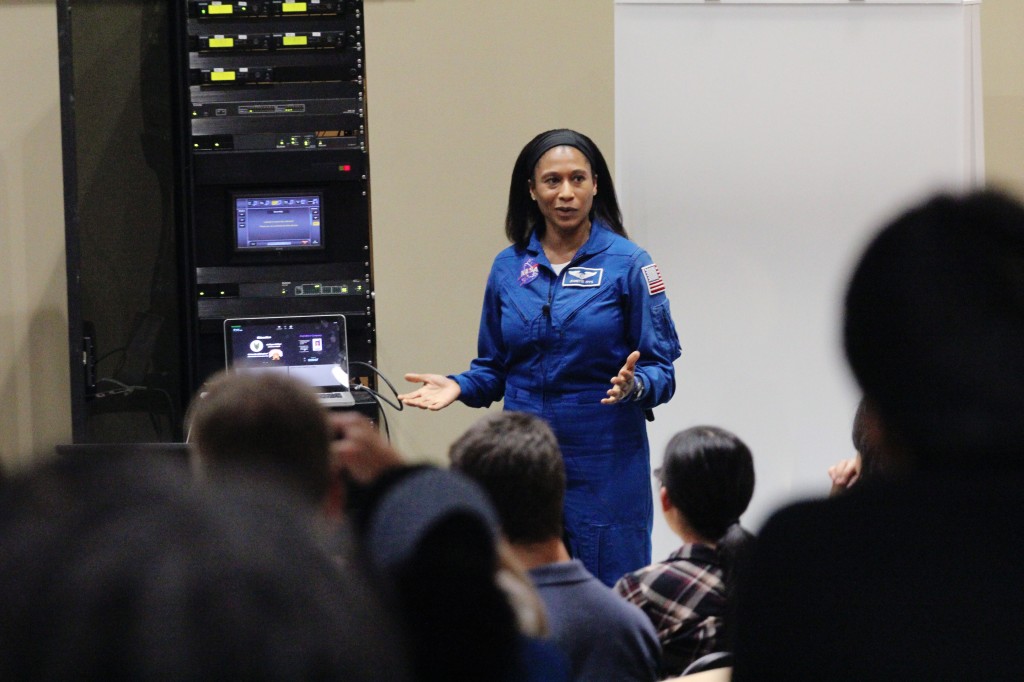
Astronaut Jeanette Epps came to Binghamton University’s Center of Excellence to speak about her experience during training and on NASA missions.
Epps, originally from Syracuse, has a bachelor’s degree in physics from LeMoyne College and a master’s degree and a Ph.D. in aerospace engineering from the University of Maryland. Prior to being selected as a candidate for the 2009 astronaut class, Epps worked as a smart materials researcher at Ford Motor Company and as a technical research officer in Iraq at the Central Intelligence Agency.
She said that she had dreamed of being an astronaut since childhood, but she encouraged those who would like to apply to the Astronaut Corps to also pursue other interests.
“Do what you love,” Epps said. “Do what you’ve always wanted to do, and then think about how that could further space expedition.”
She entered an online application process in which 3,500 applicants with backgrounds in biological science, physical science, engineering or math and research experience vied for a spot as an astronaut.
Epps completed training and became an astronaut in November 2011. Training included learning to pilot a T-38 jet, operating robotic arms aboard spacecrafts, learning emergency medical procedures and studying foreign languages.
For Epps, the most difficult component of training was the Spacewalk at the Neutral Buoyancy Lab in Houston, Texas, where candidates were dressed in full spacesuits and practiced working on the exterior of a full-scale model of the International Space Station that is submerged in a pool.
“It’s so physical; we’re in the suit for six hours,” Epps said. “Even getting suited up is a challenge.”
Outside of the technical aspects of training, Epps and her peers also completed a 10-day long hike to hone skills working as a team. Epps said that learning how to work with crew mates was vital for a successful mission.
“You get to know each other really well, and once you do that, you kind of get to know yourself as well,” Epps said. “You can explain yourself to other people.”
Epps trains and goes on missions such as the NASA Extreme Environment Mission Operations (NEEMO) expedition while waiting to be assigned to a space mission. During NEEMO, Epps and three other astronauts spent nine days living and conducting research underwater off the coast of Florida. The team was testing drills and techniques that could possibly be used on space missions.
Elizabeth Gellis, a junior majoring in English, said that Epps’s experiences of learning to work with others were helpful, regardless of career path.
“I think that there’s a lot, even if you’re not going to be a scientist, which you can glean from learning to interact with people,” Gellis said. “People who you’ve never worked with before, who you’re working with in a high stress situation, and overcoming your own mental block.”
The talk was sponsored by the Collegiate Science and Technology Entry Program, Decker School of Nursing and the Watson School of Engineering, among others.
Sharon Bryant, the project director of Collegiate Science and Technology Entry Program and also a professor in the Decker School of Nursing, said she hoped that Epps’s presentation would serve as an inspiration for students, especially young girls, who were considering fields in the sciences.
“Often times we hear that women are not good at science,” Bryant said. “Epps would be such a good role model for other little girls of color to know that yes, they too can be scientists.”
When asked to tell how she dealt with fear throughout training and missions, Epps told students to always take the risk.
“Fear is natural, but just because you’re afraid doesn’t mean you can’t do it,” Epps said. “You should have a natural fear of certain things, especially of things you haven’t done before, but once you’ve done them, it causes the fear to evaporate.”


